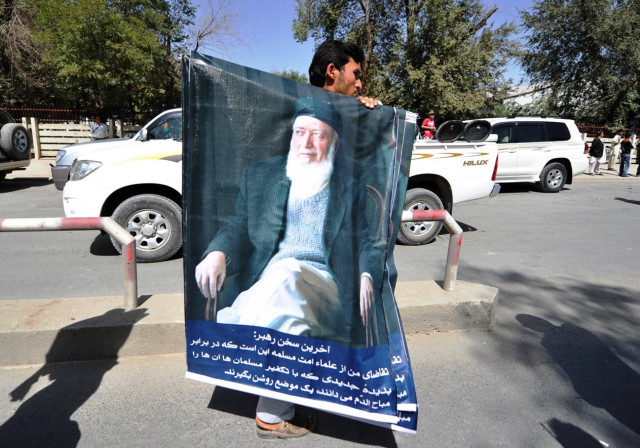Rabbani killing shows bleak hopes for Afghan peace
Afghanistan's foreign minister said bomber who killed Rabbani with explosives buried nascent peace hopes.

A decade after American troops invaded Afghanistan to bring down the Taliban for sheltering Osama bin Laden after the 9/11 attacks, the insurgency has seemingly never been stronger and the Afghan government barely ever weaker.
US President Barack Obama poured 50,000 extra troops into the country to deal the Taliban a decisive blow, but violence has only increased and attacks blamed on Taliban-led insurgents have only become bolder.
In just two months President Hamid Karzai has lost three allies – his brother Ahmed Wali Karzai, strongman of the south; advisor Jan Mohammad Khan and now his associate Rabbani – all three assassinated at home.
That Rabbani was murdered by an apparent Taliban emissary in Kabul's fortified diplomatic quarter shows insurgents can strike anywhere at any time.
And the killing of the former president, an ethnic Tajik, could also stoke renewed conflict in a nation where historical emnity runs deep between minority groups and ethnic Pashtuns from whose ranks most of the Taliban are drawn.
"It is this naive conceptualisation of the enemy from Karzai's side, saying part of the Taliban are pro-peace," Afghan former intelligence chief Amrullah Saleh told Al Jazeera television.
"We do not see any faction within the Taliban pro-peace," he added.
Many Afghans had long been sceptical of Rabbani's credentials as a potential peace broker, given the thousands of people killed in Kabul in the 1990s civil war under his presidency.
But whether or not he was capable of forging an agreement, Afghanistan's one-time deputy foreign minister Mahmood Saikal said that the bomber who killed Rabbani with explosives hidden in his turban buried nascent peace hopes.
"I think that the government will now realise that the hope of reaching peace with the Taliban is just a self-deception," said Saikal, alluding to frustration among non-Pashtuns with efforts to accomodate the Taliban.
"This proves that the culture of peace and reconciliation does not exist within the insurgents at all."
The High Peace Council, which Rabbani led and set up last year, had anyway made scant progress in exploring peace with the Taliban and was derided in some quarters as merely cosmetic.
"Whether or not Rabbani and the High Peace Council were serious about making peace, if the Taliban claim this killing, it sends a powerful message that they are not interested in talking," said Kate Clark of the Afghanistan Analysts Network.
"This would make Rabbani's assassination highly significant and dangerous for the prospects of an end to the war in Afghanistan," she added.
US efforts to reach out to the Taliban led to meetings in Germany and Qatar earlier this year with Taliban leader Mullah Omar's former private secretary but collapsed after they were leaked, Western diplomats have said.
The US ambassador to Kabul, Ryan Crocker, has since told the Wall Street Journal that insurgents needed to "feel more pain before you get to a real readiness to reconcile."
Omar said last month that the Taliban would consider "every legitimate option" in pursuit of an "independent Islamic regime" and some believe that a hardline US approach will merely alienate the Taliban further.
Some also fear that the country could slide into renewed civil war if there is no peace deal in place when American troops withdraw, under a staged drawdown due to be completed by the end of 2014.
Rabbani was seen as a mediator between different factions of Afghan warlords who fought the Taliban in the 1990s.
The murder of such a prominent Tajik and key member of the Northern Alliance could also fray Tajik support for peace efforts with the Taliban.
"I think the aim of this assassination was to reject the peace process which the Taliban regard as American-led," said Ahmad Waheed Mujdah, a former senior bureaucrat under the Taliban.
"But it was mainly aimed at further dividing and disintegrating the anti-Taliban alliance within and outside the government," he added.



1725254039-0/Untitled-design-(24)1725254039-0-208x130.webp)















COMMENTS
Comments are moderated and generally will be posted if they are on-topic and not abusive.
For more information, please see our Comments FAQ